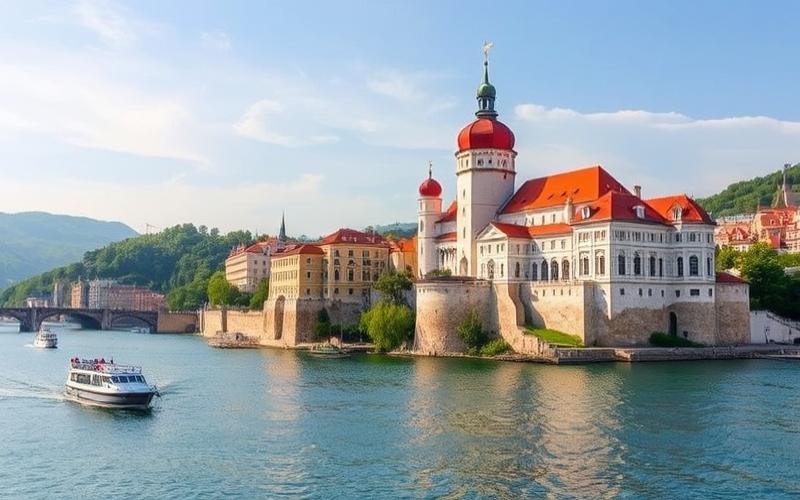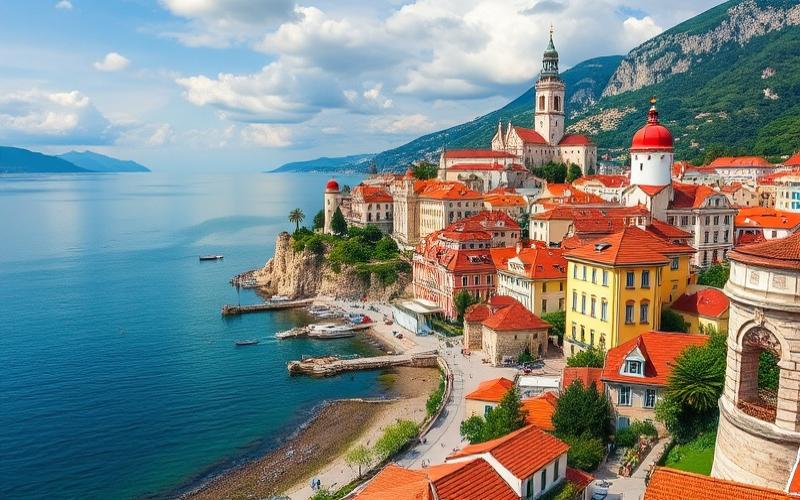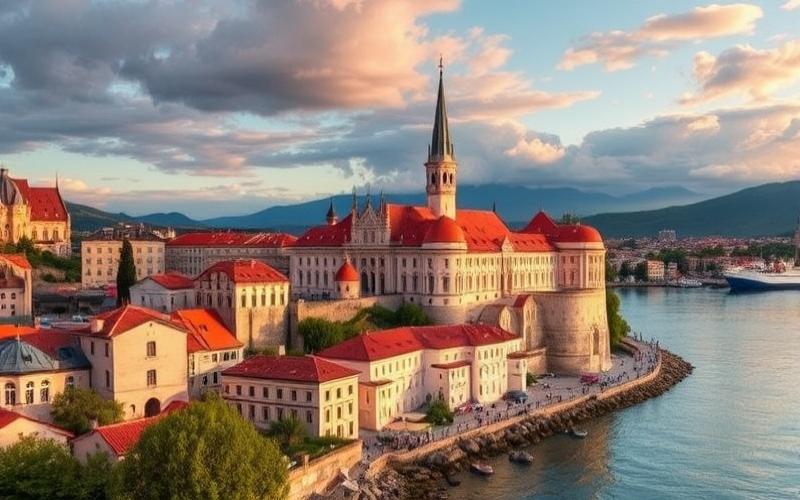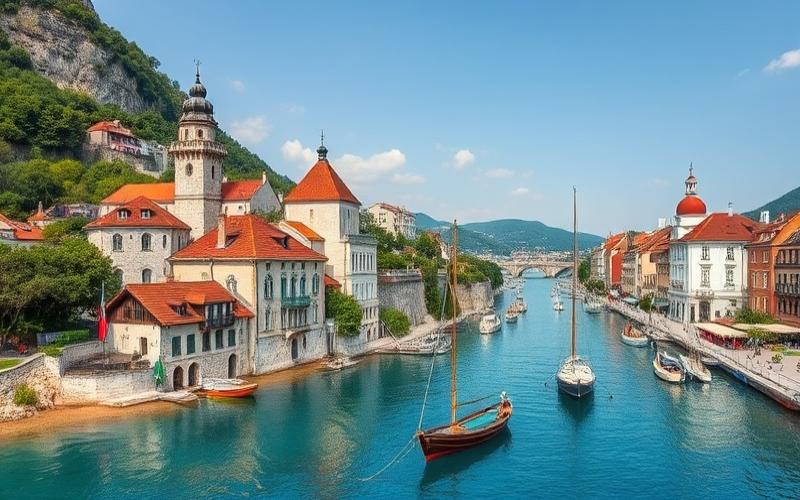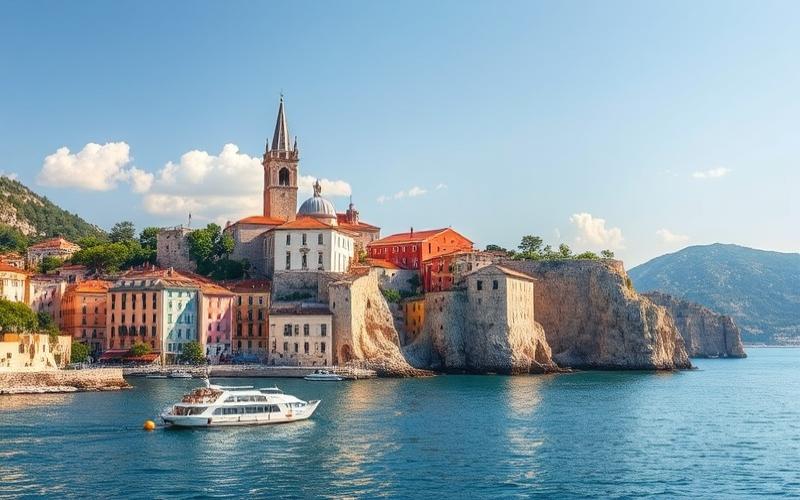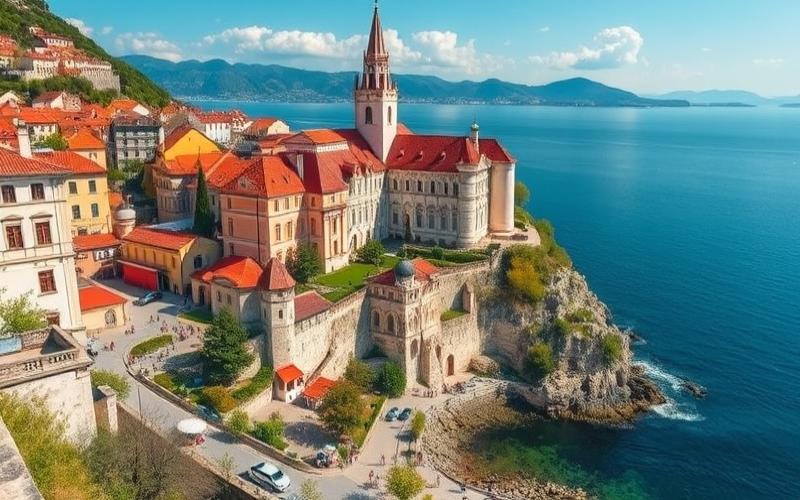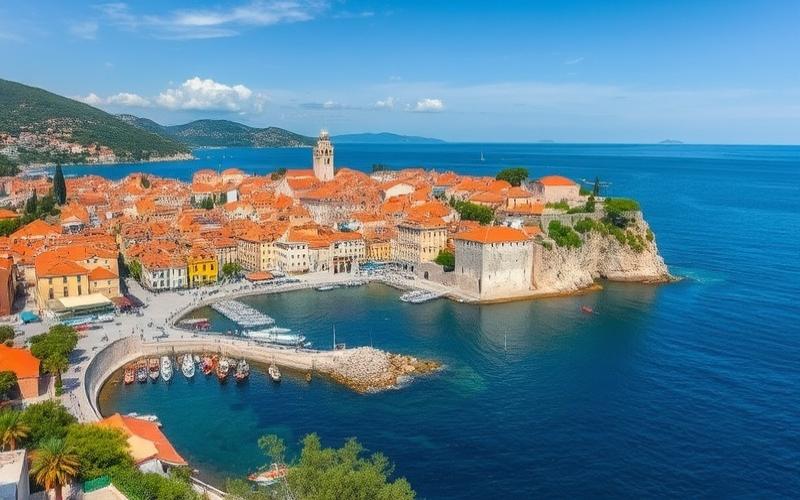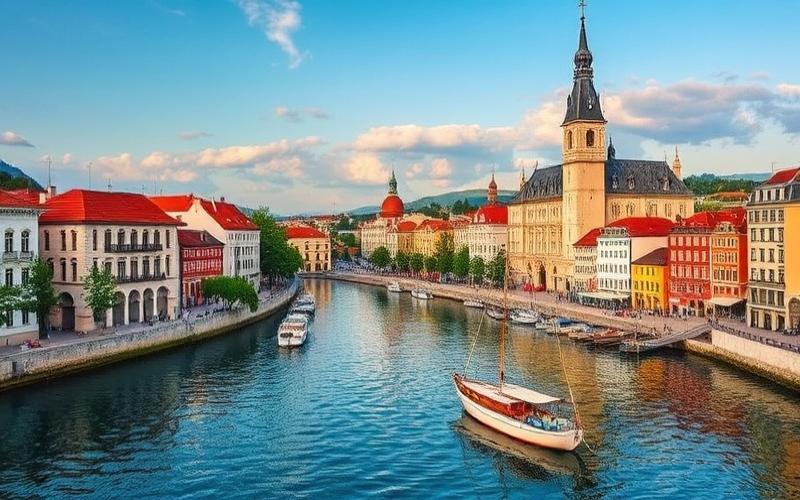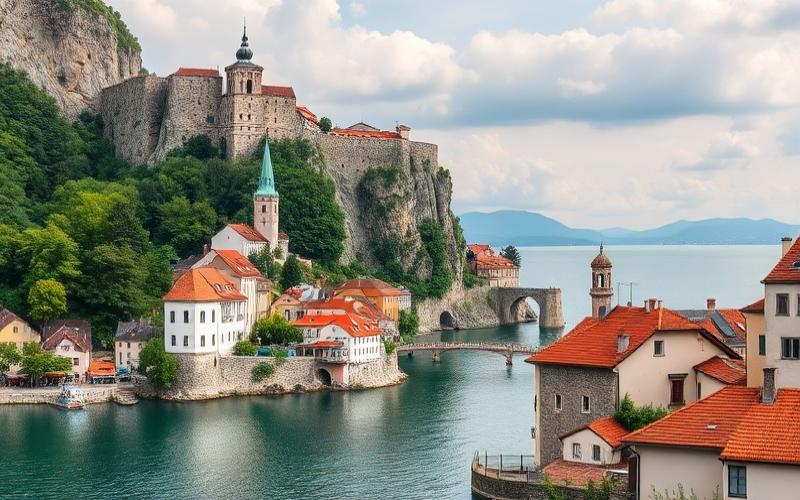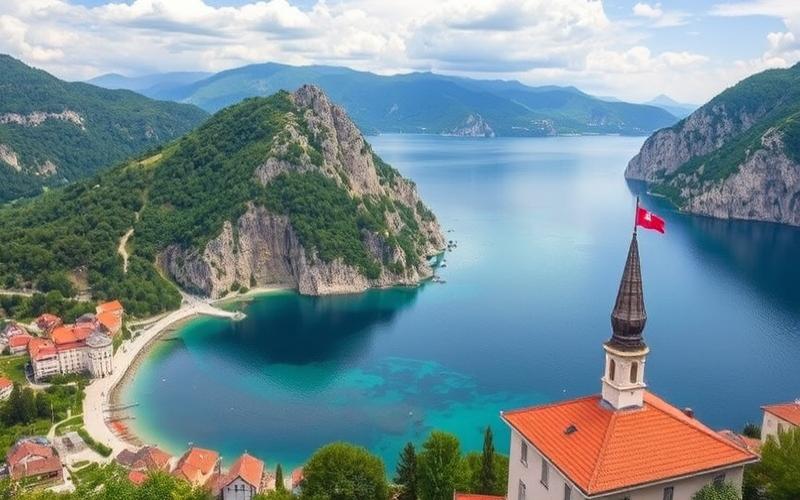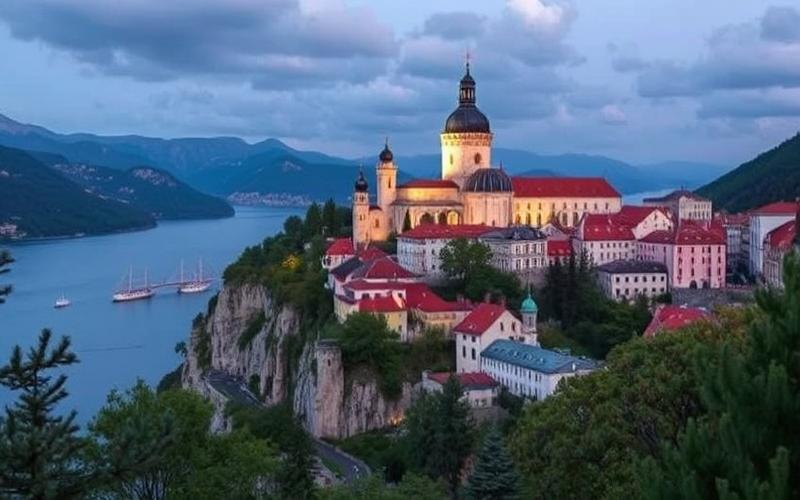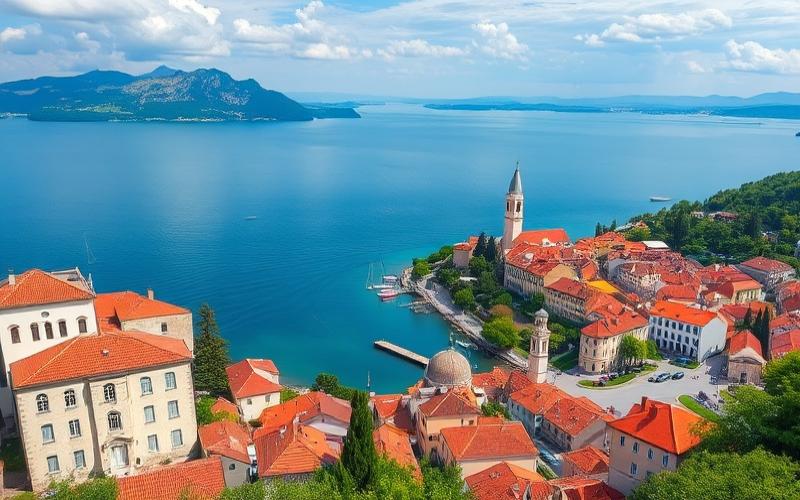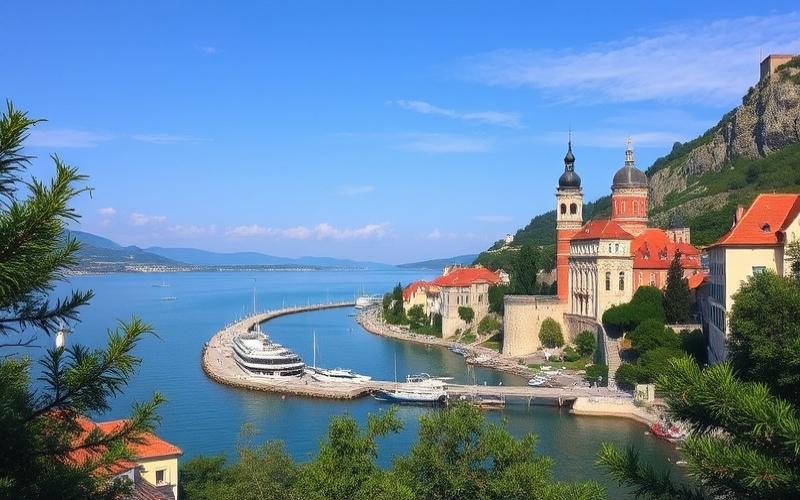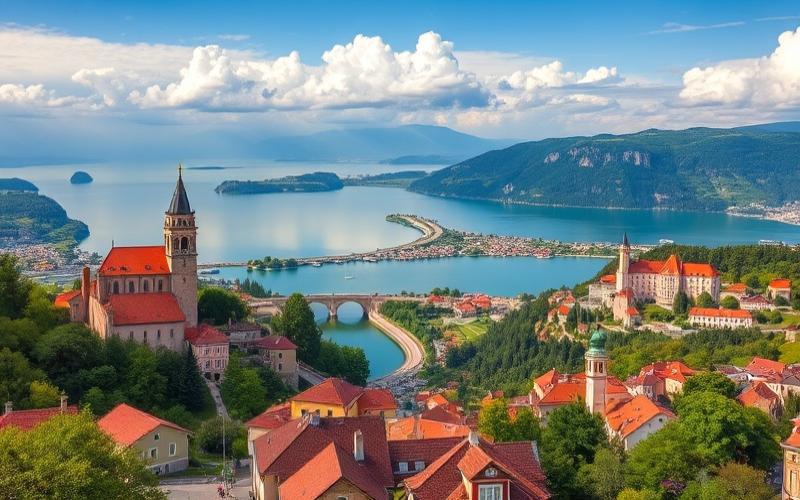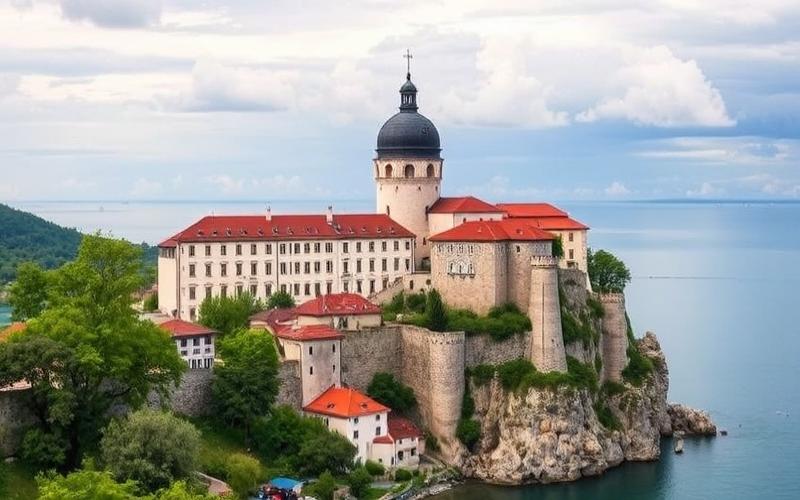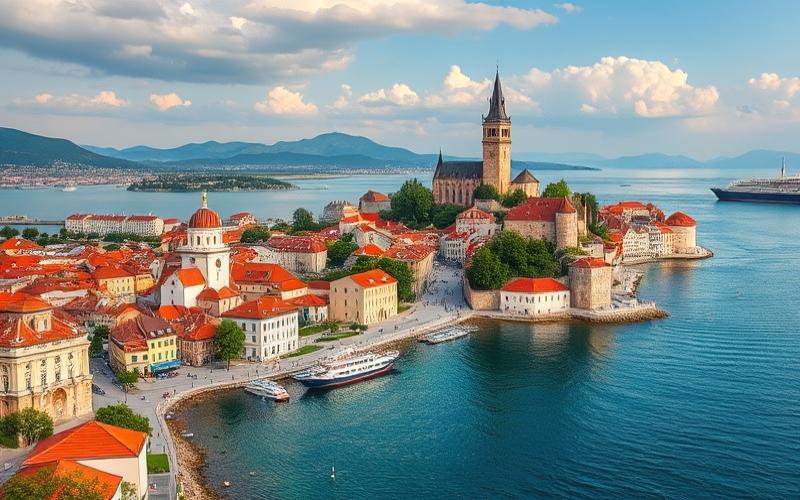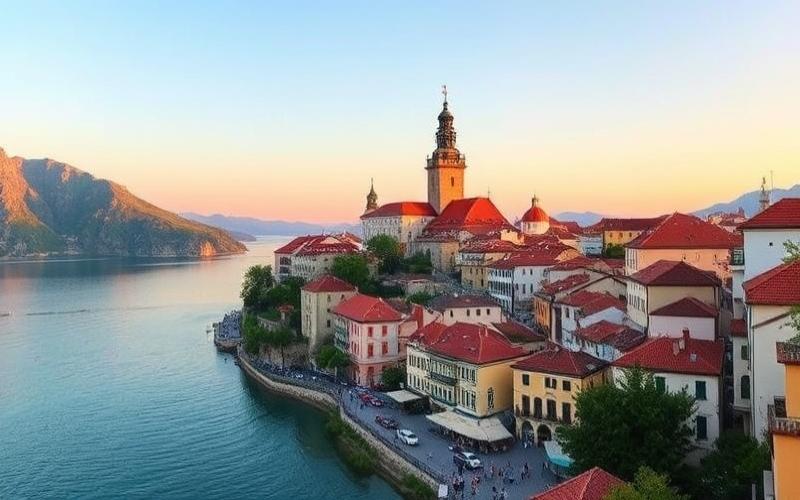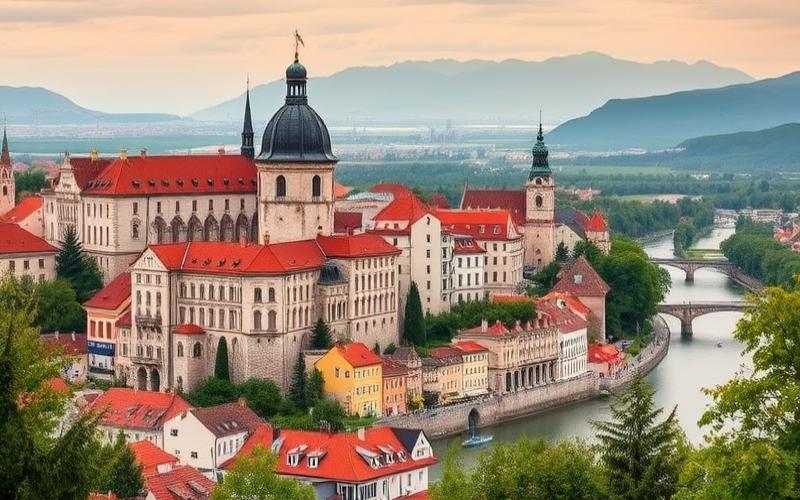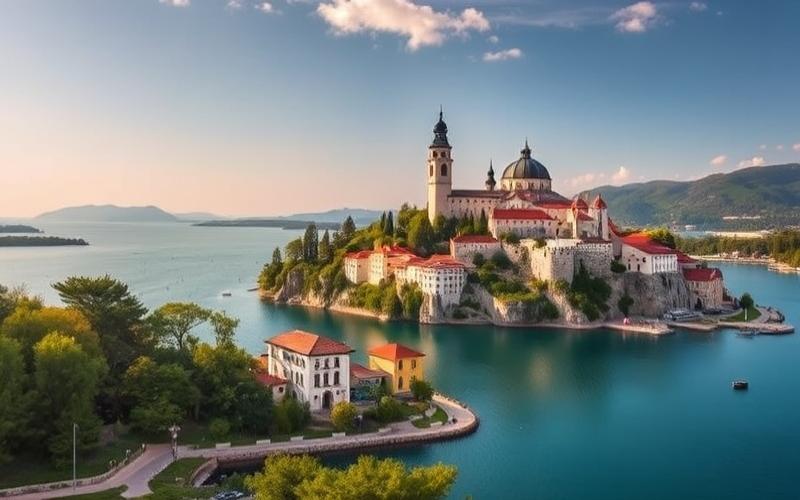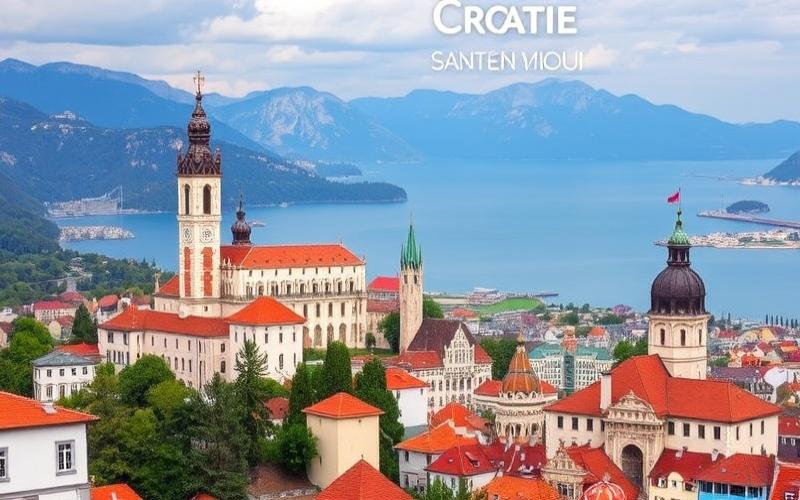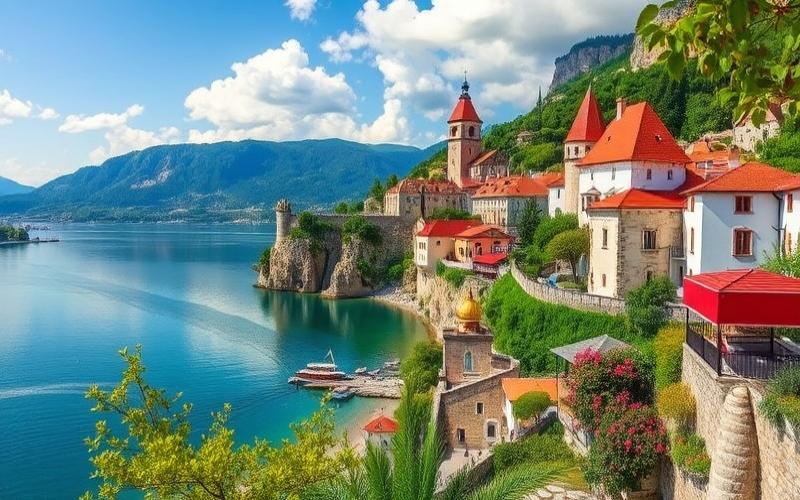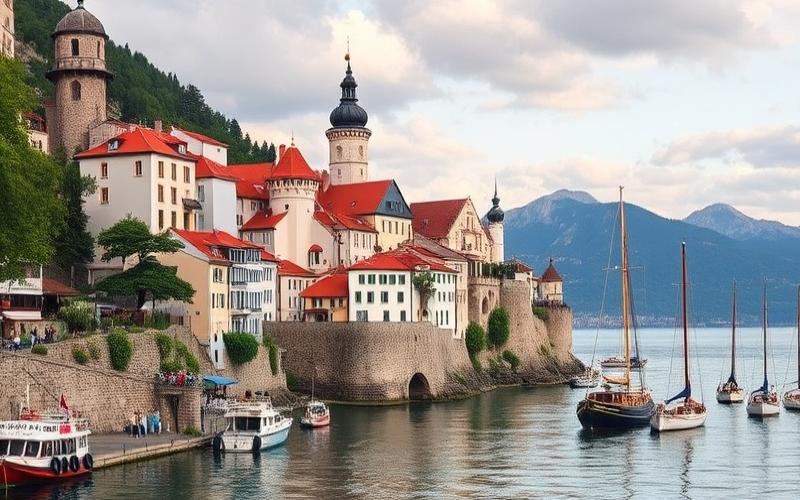
 Published on and written by Cyril Jarnias
Published on and written by Cyril Jarnias
Discovering Croatia means immersing yourself in a country where religion plays a central role in daily and cultural life. As an expatriate, it’s essential to understand local religious practices to better integrate into this tradition-rich society.
Whether participating in religious festivities or visiting historic places of worship, this guide explores the multiple facets of Croatian spirituality. It will help you navigate a landscape of beliefs where the Catholic Church holds a predominant place, while respecting the religious diversity that marks certain regions of the country.
Dive into a world where spirituality and culture intertwine, and discover how these practices shape the social and cultural fabric of your new home country.
Introduction to Religious Practices in Croatia
Croatia stands out for its religious diversity dominated by the Roman Catholic Church, which comprises approximately 79% of the population according to the 2021 census. Other significant religious communities include Serbian Orthodoxy (3.3%) and Islam (1.3%), while Protestants, Jews, and other religious minorities together represent less than 1% of the population. Nearly 6.4% of Croatians declare themselves atheists and 3.9% did not declare a religion.
| Religion | Percentage (2021) |
|---|---|
| Catholicism | 78.97% |
| Orthodoxy | 3.32% |
| Islam | 1.32% |
| Protestantism | 0.26% |
| Judaism | 0.02% |
| Other religions | 0.96% |
| Atheism | 6.39% |
| Undeclared/undecided | 3.86% |
The influence of the Roman Catholic Church is strongly manifested in culture, education, and daily life. Religious holidays such as Christmas, Easter, All Saints’ Day, and the Assumption are national holidays, celebrated with processions, masses, and family gatherings. Many local festivals, called fešte or proslave, mark the rhythm of the year and define the identity of towns and villages. These traditions structure social life and strengthen community cohesion.
Good to know:
Religion shapes Croatian social customs: greetings, weddings, funeral rites, and even the school calendar reflect the weight of Catholicism in society.
Other religious communities, particularly Serbian Orthodox and Muslims, are concentrated in certain regions: Orthodox in the east and south of the country, Muslims mainly in Slavonia, Zagreb, and some coastal towns. Their coexistence with the Catholic majority has generally stabilized after the tensions of the 1990s, although identity issues persist in certain contexts.
Historically, the presence of Christianity dates back to antiquity, strengthened in the Middle Ages with integration into the Latin sphere. Orthodoxy developed with the arrival of Serbian populations under the Ottoman Empire, while Islam appeared with the Ottoman expansion into Southeastern Europe. Jewish communities, once more numerous, were tragically decimated during World War II.
For expatriates, the predominance of Catholic practices can influence social integration. Respecting religious customs is expected, especially during holidays or in public spaces. Expatriates should be attentive to certain implicit rules, such as discretion during religious ceremonies or respect for holidays when many services are closed. Croatian society generally remains welcoming, but adapting to these traditions facilitates integration and promotes better understanding of local dynamics.
List of major national religious holidays:
- Christmas (Božić, December 25)
- Easter (Uskrs, variable date)
- All Saints’ Day (Svi sveti, November 1)
- Assumption (Velika Gospa, August 15)
- Corpus Christi (Tijelovo, variable date)
Religious practices therefore strongly influence public life, family, and social relations in Croatia, while coexisting with a growing minority of non-believers and other faiths, within an institutional framework guaranteeing religious freedom and the separation of church and state.
Good to know:
In Croatia, although the Catholic Church predominates with about 86% of the population, it’s important to respect traditions during religious holidays and become aware of Serbian and Muslim minority customs to better integrate socially.
Understanding Major Religious Holidays
| Holiday | Date | Catholic Tradition | Orthodox Tradition | Local Particularities |
|---|---|---|---|---|
| Christmas | December 25 | Midnight mass, nativity scene, carols, family meal, gift exchanges, Christmas markets, Advent traditions | Celebrated January 7 according to Julian calendar, specific liturgy, prior fasting, celebrations more focused on liturgy | Pilgrimages, wearing traditional costumes, festive markets |
| Easter | March/April | Processions, solemn mass, decorated eggs (pisanice), food blessings, carols, festive meals | Resurrection liturgy, procession around church, red eggs, Great Lent fasting | Offering decorated eggs to loved ones, public festivities |
| Assumption | August 15 | Grand processions (e.g., Rijeka, Sinj, Trsat), Marian pilgrimages | Also celebrated by Orthodox but less marked publicly | Major pilgrimages (Sinj, Trsat, Krasno) |
| St. Blaise’s Day | February 3 | Patron saint feast of Dubrovnik, throat blessings, costumed processions, solemn opening of city gates | Not celebrated | Great popular fervor, symbol of Dubrovnik’s identity |
Differences Between Catholic and Orthodox Traditions
- Calendar: Catholics follow the Gregorian calendar, Orthodox follow the Julian calendar, which shifts certain holidays (notably Christmas and Easter).
- Rituals: Catholics favor processions, masses, popular songs, while Orthodox emphasize liturgy and fasting.
- Presence in public space: Catholic holidays are national holidays and widely celebrated throughout the country, Orthodox holidays are more specific to certain regions and communities (particularly in the east and south).
Importance of Easter and Christmas
- Easter: The most important holiday for Christians, marking Christ’s Resurrection. In Croatia, it’s celebrated fervently: egg decorations, candlelit processions, blessings, and family feasts. It’s a key time for reunions, sharing, and solidarity.
- Christmas: A time of reflection, conviviality, and generosity. Christmas markets, carols, and nativity scenes animate towns. Families gather around traditional meals and inherited rituals (lighting Advent candles, Christmas tree).
Specifics of Certain Local Holidays
St. Blaise in Dubrovnik (Festa svetog Vlaha)
- Iconic festival of Dubrovnik, dedicated to the city’s patron saint.
- Solemn procession through streets, carrying banners, traditional costumes, symbolic opening of city gates.
- Throat blessings (against throat ailments), concerts, popular festivities.
- This festival is a strong marker of local identity and attracts many visitors.
Our Lady of Sinj, Trsat and Other Marian Sanctuaries
Major pilgrimages for the Assumption or other Marian feasts, gathering thousands of faithful in fervor and conviviality.
Lesser-Known but Significant Holidays
- Corpus Christi: Processions in villages and towns.
- St. Roch, St. Joseph, St. Domnius: Local celebrations with processions and popular rites.
- Eid al-Fitr, Eid al-Adha, Rosh Hashanah, Yom Kippur: Recognized holidays for Muslim and Jewish minorities, illustrating Croatian religious pluralism.
Perception and Experience by Locals
These holidays are experienced as moments of great spiritual intensity, social cohesion, and transmission of traditions.
They offer opportunities to strengthen family bonds, pay homage to collective memory, and celebrate belonging to a community.
Practical Tips for Expatriates
- Learn about the meaning of holidays and respect moments of reflection (processions, masses).
- Participate in public festivities (markets, concerts, processions) with a respectful and discreet attitude.
- During family holidays (Christmas, Easter), accepting an invitation is an honor: it’s customary to bring a small gift (pastry, flowers, decorated eggs at Easter).
- Avoid criticizing or trivializing beliefs or rituals, even if they seem unusual.
- During St. Blaise’s Day in Dubrovnik, attending the procession is highly recommended, while respecting the space of the faithful.
- Expatriates can also discover the richness of Orthodox traditions during celebrations in relevant regions, by inquiring locally about the calendar.
To best experience religious holidays in Croatia: respect, curiosity, and open-mindedness are the best keys to integration and personal enrichment.
Good to know:
In Croatia, Easter is celebrated with processions and traditional dishes like smoked ham, while Christmas brings together families and colorful markets; expatriates can attend festivities like St. Blaise’s Day in Dubrovnik, while respecting local rites.
Cultural Adaptations and Appropriate Behaviors for Expatriates
Croatia is a country where Catholicism occupies a central place in society and national identity, with approximately 87-90% of the population declaring themselves Catholic. Other Christian denominations, such as Orthodoxy (mainly among Croatian Serbs) and Protestantism, as well as Islam and atheism, remain very much in the minority.
Dominant Religious Practices:
- The majority of Croatians are Catholic and many holidays, rituals, and traditions are linked to the liturgical calendar.
- Major religious holidays (Christmas, Easter, Assumption, All Saints’ Day) are widely celebrated and lead to family and community gatherings.
- Regular religious practice (mass, sacraments) is less followed by younger urban generations but remains important in rural areas and during major events.
Cultural Adaptations for Expatriates:
Participation and Respect:
- It’s well-regarded to respect religious holidays: shops and administrations often close on these days.
- Participating or showing respect during holidays and rituals (processions, masses, blessings) is appreciated, even for non-believers.
- Family rites (baptisms, weddings, funerals) are key moments where respectful participation strengthens integration.
Dress Code and Attitude in Places of Worship:
- Modest attire: shoulders and knees covered for all, head uncovered for men inside churches.
- Silence and discretion: avoid speaking loudly, don’t take photos without permission, turn off your phone.
- Reserve spaces for prayer or ceremonies.
- During communion or processions, it’s preferable to observe without participating if you’re not Catholic.
Appropriate Behaviors in Places of Worship:
| Situation | Recommended Behavior |
|---|---|
| Church visit | Enter calmly, avoid short or flashy clothing |
| Taking photos | Ask permission, avoid during services |
| During mass | Remain seated or standing quietly, avoid moving around |
| Entry/exit | Show respect, avoid disturbing the faithful |
Differences in Perception and Religious Values:
- Religion and national identity are strongly linked: Catholicism is perceived as a pillar of Croatian culture.
- Traditional values (family, respect for elders, community solidarity) are influenced by Catholic morality.
- Social debates (marriage, sexuality, place of religion in public space) may be more conservative than in other European countries.
- Expatriates should show tolerance towards these specificities and avoid openly criticizing local beliefs.
Tips to Facilitate Integration:
- Inform yourself about the religious holiday calendar and show interest in traditions.
- Adopt an open, respectful, and curious attitude during religious events.
- Conform to local customs in places of worship, even as a visitor.
- Avoid controversial topics concerning religion in public conversations or with strangers.
Key Takeaways:
Respectful participation in religious holidays and adopting discreet and appropriate behavior in places of worship are essential for harmonious integration into Croatian society.
Understanding the place of Catholicism and traditional values facilitates expatriates’ daily life and promotes mutual respect.
Good to know:
In Croatia, adopt modest attire during church visits and participate respectfully in religious holidays, as Catholicism plays a central role in local culture. It’s essential to understand and respect differences in religious values for better integration.
Religious Freedom and Resources for Personal Practice
Laws and Regulations Concerning Religious Freedom in Croatia
Croatia guarantees religious freedom through its Constitution, which provides for separation of church and state and equality of all religious communities before the law. Article 41 specifies that all religious communities are free to hold public services, open schools, organize charitable activities, and benefit from state protection and assistance in these activities. Freedom of conscience, religion, and expression is also protected by Articles 14, 38, and 40 of the Constitution.
The 2002 Law on the Legal Position of Religious Communities defines:
- Registration conditions for religious groups (minimum 500 members and 5 years of existence for new groups).
- Rights to legal personality, tax benefits, religious education, recognition of religious marriages, and individual negotiation of certain rights with the state.
- The possibility for each community to conclude specific agreements with the government.
Religions Practiced in Croatia
Religious diversity in Croatia is distributed as follows:
| Main Religion | Description and Status |
|---|---|
| Catholic Church | Majority, benefiting from special agreements with the state. |
| Serbian Orthodox Church | Specific agreement with the state. |
| Islam | Specific agreement with the state. |
| Protestantism (Baptists, Pentecostals, Reformed, Adventists) | Several recognized churches. |
| Judaism, Buddhism, Hinduism | Presence of small communities. |
In 2013, the official registry counted 62 recognized religious organizations.
Resources for Expatriates: Places of Worship, Organizations, Services
- Places of worship: Major cities have Catholic, Orthodox, Protestant churches, mosques, and synagogues. The largest communities (Catholic, Orthodox, Muslim) have developed infrastructure in large cities.
- Community organizations: Many religious communities offer welcome groups, cultural events, and social services. Some, like the Catholic Church, offer services in foreign languages.
- Services offered: Celebrations, spiritual support, language courses, children’s activities, integration assistance, chaplaincy service in the military, prisons, and hospitals for denominations with state agreements.
Cultural or Linguistic Barriers for Expatriates
- Croatian is the main language of religious services, although some communities (notably Catholic, Orthodox, Muslim) offer services in other languages in large cities.
- Small religious communities may be concentrated in certain urban centers, limiting access outside major cities.
- Cultural differences in religious practice (rites, habits, holiday calendar) may require an adaptation period.
Tips for Overcoming These Challenges
- Search for places of worship and religious groups via embassies, social networks, or religious community websites before arrival.
- Contact local community organizations that often offer services to newcomers.
- Participate in multicultural events to meet other expatriates sharing the same faith or open to religious diversity.
- Learn basics of Croatian or inquire about services offered in other languages.
Impact of Religious Diversity on Croatian Society and Mutual Respect
Croatian society is predominantly Catholic, but religious diversity is legally recognized and protected. Expatriates are encouraged to respect local customs and participate in interreligious dialogue, which is promoted by authorities and main communities. Peaceful coexistence is the norm, although the visibility of certain minority religions remains limited in public space. Mutual respect is maintained through tolerance, curiosity, and engagement in interfaith initiatives.
| Tips for Maintaining Mutual Respect |
|---|
| Adopt an open attitude towards religious differences |
| Inform yourself about main local holidays and customs |
| Avoid controversial discussions about religion in formal contexts |
| Participate in interreligious events and open house days |
Good to know:
Croatia guarantees religious freedom in its constitution, with places of worship such as churches, mosques, and synagogues available for expatriates; however, it’s advisable to connect with local communities to overcome potential linguistic and cultural barriers.
Disclaimer: The information provided on this website is for informational purposes only and does not constitute financial, legal, or professional advice. We encourage you to consult qualified experts before making any investment, real estate, or expatriation decisions. Although we strive to maintain up-to-date and accurate information, we do not guarantee the completeness, accuracy, or timeliness of the proposed content. As investment and expatriation involve risks, we disclaim any liability for potential losses or damages arising from the use of this site. Your use of this site confirms your acceptance of these terms and your understanding of the associated risks.

